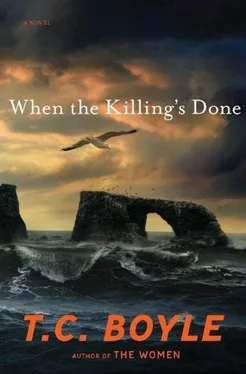The rats persisted, gnawing, thieving, slipping in and out of their cracks, thumping in the night, and she persisted too — her fires, of necessity, smaller, but beacons nonetheless, urgent smoldering pleas for help, for release. She saw boats suspended in the distance with their tiny quavering sails and she waved her arms like a cheerleader, fashioned flags from sticks and the tatters of an old faded-to-pink towel and waved them too, but the boats never grew larger or drifted out of frame, as static as figures on a canvas tacked to the very farthest wall in the most enormous room in the world. No one came. No one landed. No one existed. And where was Till? Where was he? He would have come for her by now, if he was alive, and how could he possibly have died in America, aboard his own boat off the lobster-rich Channel Islands, when the Japs hadn’t been able to sink him in the whole wide blinding expanse of the Pacific?
The answer was too hard to hold on to so she let it go. She let it all go. Even the rats. And then, on the first day of what would have been the third week of her imprisonment in a place she’d come to loathe in its changeless, ceaseless, ongoing and never-ending placidity and indifference and sheer brainless endurance, a Coast Guard cutter, free as a cloud, rounded the point and motored into the cove.
And what did the Coast Guard find? A sunburned woman unused to the sound of her own voice, her hair stringy and flat and her eyes focused on nothing. She was the wife of a drowned man, a widow, that was all. She climbed into the rowboat and the sea shifted beneath her and kept on shifting until the big boat, the cutter, sliced across the channel under the downpouring sun, until the shore, with its sharply etched houses, swaying palms and glinting automobiles, rose up to take her in and hold her as firmly and securely as she could ever hope to be held again.
The Wreck of the Winfield Scott
T hough Alma is trying her hardest to suppress it, the noise of the freeway is getting to her. She can’t think to slice the cherry tomatoes and dice the baby carrots, can’t clear her head, can barely hear Micah Stroud riding the tide of his emotions through the big speakers in the front room. Normally, aside from the odd siren or the late-night clank of the semitrucks fighting the drag of the atmosphere on the long run up the coast, the sound is continuous, white noise, as naturally occurring a phenomenon and no different in kind from the wind in the eucalyptus or the regular thump of the surf at Butterfly Beach, and she’s learned to ignore it. Or at least live with it. But this is rush hour, when every sound is magnified and people accelerate randomly only to brake half a second later, making use of their horns an estimated eighty-seven percent more often than at any other time of day — a statistic she picked up from the morning paper and quoted to everybody at work in support of her conviction that mechanized society is riding its last four wheels to oblivion, not that anybody needed convincing. And her condo — over-priced and under-soundproofed — occupies the war zone between the freeway out front and the railroad tracks in back, a condition she’s been able to tolerate for its access to the beach and the cool night air, and the option, which she almost always takes, even when it rains, of sleeping with the window open and a blanket wrapped tightly around her through all the seasons of the year.
Today, however — tonight, this evening — she’s on edge, denying herself the solace of a glass of wine. Or sake on the rocks, which is what she really wants. Sake out of the bottle she keeps chilled in the refrigerator, poured crackling over the ice cubes in a cocktail glass, one of the six special glasses remaining from the set of eight she inherited from her grandmother, clear below, frosted above, with the proprietary capital B etched into its face. She swallows involuntarily at the thought of it, thinking Just half a glass, a quarter . The carrots — slick, peeled and clammily wet in the cellophane package — feel alive beneath her fingers as she steadies them against their natural inclination to roll out from under the blade of the knife. On goes the tap with a whoosh, the tomatoes tumbling under the spray in the perforated depths of the colander. A horn sounds out on the freeway, a sudden sharp buzz of irritation and rebuke, and then another answers and another. She pictures the drivers, voluntarily caged, one hand clamped to the wheel, the other to the cell phone. They want. All of them. They want things, space, resources, attention to their immediate needs, but they’re getting none of it — or not enough. Never enough.
Of course, she’s one of them, though her needs are more moderate, or at least she likes to think so. And no, the sake isn’t a serious temptation — she can do without. Has to. Because if anything defines her it’s self-control. And drive. And smarts. People look at her and think she’s some sort of uptight science nerd — the people who want to tear her down anyway — but that’s not who she is at all. She’s just focused. Everything in its time and place. And the time for sake —in her grandmother’s etched glass with the B for Boyd front and center — is after the lecture. Or information session. Or crucifixion. Or whatever the yahoos want to make it this time.
The anger starts in her shoulders, radiating down her arms to her fingers, the knife, the mute unyielding vegetables. Furious suddenly, she flings down the knife and stalks into the front room to crank up the stereo, staring angrily out the window at the off-ramp and the rigid column of invasives Caltrans planted there to mask the freeway from her — and her from the freeway, though she expects the pencil pushers in Sacramento didn’t really have her welfare in mind when they ordered the hired help to plant oleander, in alternating bands of red, white and salmon pink, along both shoulders. If there’s a bird or a lizard or a living creature other than Homo sapiens out there, she can’t see it. All she can see, through the gaps in the bushes, is the discontinuous flash of light from the coruscating bumpers and chrome wheels and streaming rocker panels of the endless line of carbon-spewing vehicles inching by, thinking Seven billion by 2011, seven billion and counting. And where are we going to put them all?
While she’s standing there, Micah Stroud cruising high on his Louisiana twang over a low-pressure system of furious strumming and dislocated bass, one of the cars detaches itself from the flow — or lack of flow — and rockets down the off-ramp right in front of her. It’s a white Prius, humped, ugly, forgettable but salvatory, and unlike any of the other white Priuses on the road, this one contains her familiar — her boyfriend, that is, Tim Sickafoose — and he’s staring right at her with a look of startled recognition, waving now, even as the car slides out of sight and into the drive.
By the time he comes through the door, she’s back in the kitchen, keeping things simple: toast the pita, dice the carrots, slice the tomatoes, toss the salad. Hummus out of the plastic deli container, feta in a thick white slab so perfect the goat might have given birth to it. Somewhere on its farm. With all the other goats. Naa, naa, naa .
They are not the kind of lovers, she and Tim, who peck kisses when they enter rooms or hang from each other like shopping bags in public. They give each other space, time to adjust. Before she can breathe “Hey,” the usual greeting, he’s at the table, cracking a beer, his backpack splayed open on the floor beside him.
The view out the kitchen window is of raffia palms against a white stucco wall draped with bougainvillea, at the base of which a heavily mulched bed of clivia and maidenhair fern bows to an overwatered lawn of Bermuda grass so uniformly and unwaveringly green it pulls the color out of everything. Beyond the wall, a stand of eucalyptus that gives off a fierce mentholated funk in the rainy season so that everything smells of fermenting cough drops, and beyond the eucalyptus a gap for the railroad tracks, then the faded-to-pink roof tiles of the hotel that gives onto the ocean — the ocean she can’t see from here and can just barely make out from the upstairs bedroom. This is a view that irritates her. A view that’s as wrong as it can be, and not simply because it’s wasteful and cluttered and composed entirely of alien species, but because it defeats the whole point of living within sight of the ocean.
Читать дальше












